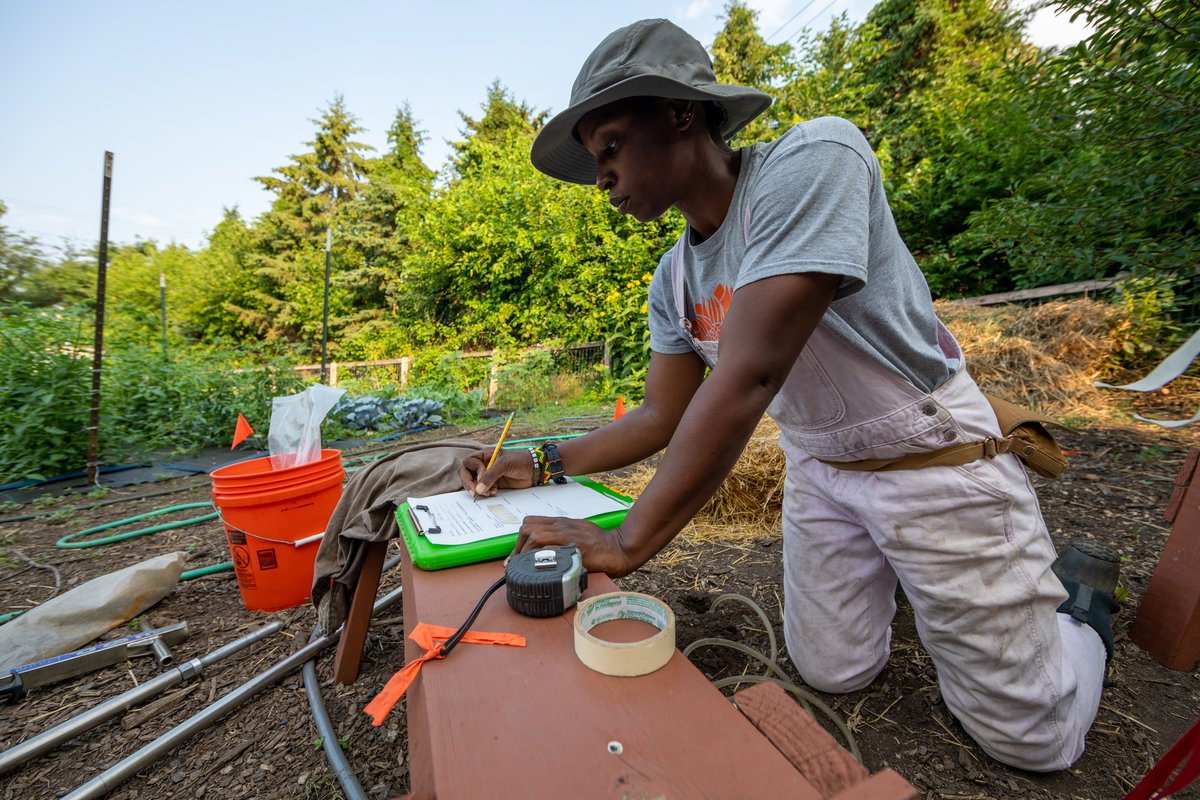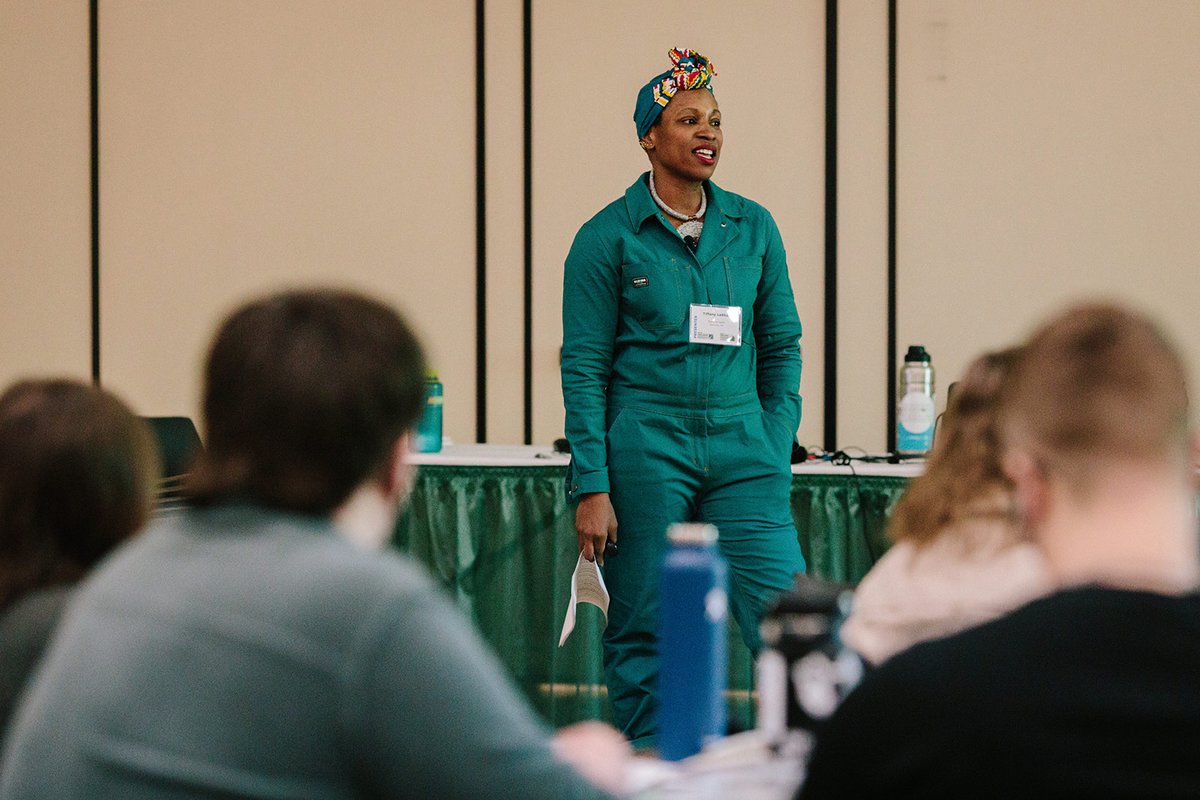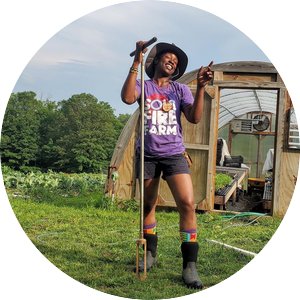Tiffany LaShae is healing the soil and the historical trauma of a racist food system.

“One of the most radical and revolutionary things you can do is grow your own food and eat from the land,” says Tiffany LaShae, master’s student in the Graduate Program in Land and Atmospheric Science. Just 2% of farmers in the United States are Black, and LaShae is a leader among them. A vegetable farmer, food justice activist, and soil health educator, LaShae is empowering farmers of color and activating white allies throughout the Midwest and the country.
In February, LaShae and her UMN colleagues led a day-long Farmers Against Racism workshop, a professional development option for attendees of the Midwest Organic & Sustainable Education Service (MOSES) Organic Farming Conference in La Crosse, Wisconsin. The workshop was co-developed and facilitated by Cori Bazemore-James, PhD, Phoebe Young, and Taz Mueller.
The workshop laid bare the violent and traumatic history of agriculture in the United States, from land theft and genocide of Indigenous peoples by European colonizers, to enslavement of African peoples and the plantation slave economy of the American colonies and later the United States. This disgraceful legacy also includes discriminatory practices codified by private institutions such as banks and governmental agencies like the USDA, and the exploitation of migrant agricultural laborers that persists today.
Despite our country’s history, the workshop offered hope for positive change by continuing with an emphasis on ”allyship and steps to take together to enable relationship building and uphold principles of land stewardship.” LaShae and her co-facilitators used tools like the Racial Healing Wheel, a resource from the Racial Healing Handbook by Anneliese A. Singh, PhD, to facilitate vulnerable discussion among the participants. Thoughts were shared on colorful Post-It notes with ideas for restorative actions towards the land, non-human relatives, and each other. “It made for a full day of gratitude, grieving, and growing,” said LaShae.
Racism and resilience

Farmers Against Racism was informed by LaShae’s personal experience of being a Black farmer and a woman in agriculture, and the barriers that she and her community continue to encounter. LaShae has worked with MOSES on a project to support the success of Black, Indigenous, and people of color (BIPOC), part of their Farmer Advancement initiative. She also hosted a podcast called In Her Boots, highlighting the work of women and BIPOC in agriculture. According to LaShae, “MOSES is really trying to do the difficult work” of antiracism in an industry that still has room for improvement.
But progress is not linear. An example LaShae shared was the stimulus bill signed by President Biden in March 2021, which included debt relief to help minority farmers. Part of a $1.9 trillion economic relief package, $4 billion in debt relief to minority farmers was intended “to make amends for the discrimination that Black and other nonwhite farmers have faced from lenders and the Agriculture Department over the years,” according to the New York Times. However, the bill quickly became mired in controversy as some white farmers felt they were victims of “reverse racism” and sued the USDA. Nearly a year later, that funding still hasn’t reached the farmers it was intended to help, and as a result some have fallen deeper into debt.
Senator Tina Smith of Minnesota said, “We have to acknowledge that the USDA has a history of institutionalized discrimination against Black farmers and farmers of color. That is the history we cannot look away from,” when she and colleagues introduced the Justice for Black Farmers Act to the U.S. Senate in February 2021. The bill has been read before the Senate and referred to the Committee on Agriculture, Nutrition, and Forestry, but no further action has been taken.
Boots on the ground

Originally from Texas, LaShae’s roots in food and farming were born out of the realization that her family and community were experiencing nutrition-related diseases. They did not have easy access to fresh vegetables. “The majority of the people around me were suffering… and at the time I didn't know why,” she said.
LaShae uses the term “food apartheid,” a term coined by Karen Washington, rather than “food desert,” to describe the setting. “This is an area on the south side of Dallas that was redlined,” she explained. The effects of redlining, a discriminatory and oppressive lending and urban planning policy in place in 1930s through 1960s, are still felt today; proximity to grocery stores can be one such effect.
Making the connection between heath, nutrition, and growing food was a pivotal moment for LaShae: “That's when the light switch was flipped, and I discovered all of the things that are associated with healthy foods in our communities.” She got involved with urban farming and community gardens, which led to organizations advocating for food and climate justice. She spent the next decade developing her skills as a vegetable farmer across the country. She found community with Black farmers, educators, and activists like Ron Finley in South Central Los Angeles, the Black Dirt Farm Collective in Maryland, Soul Fire Farm in upstate New York, and Big River Farm in Minnesota. “This was farming rooted in fighting the oppressive food system,” said LaShae.
When the growing seasons ended in the U.S., LaShae spent winters in Africa, partnering with non-profit organizations to support farmers in rural villages. “These were folks whose survival depends on the health of their soil,” she said. LaShae traveled to Mozambique, Ethiopia, Malawi, and Uganda, where farmers had to adapt to the effects of climate change. “The soil was heavily eroded. There was no topsoil. Oftentimes there was deforestation, so there was no buffer…” she said. “That sparked my interest in soil health, and specifically farmer perception of soil health and land management.”
Cultural connections to soil
While working as the farm manager of Frogtown Farm in St. Paul, LaShae met Nic Jelinski, PhD, a soil scientist and faculty member in the Department of Soil, Water, and Climate. According to LaShae, Jelinski “shares this passion of going beyond the quantitative aspects of soil, looking deeper into relationships and connections between communities and soil.” Under his mentorship, LaShae began working towards her master’s degree in LAAS last year. She plans to explore the connections between farmer knowledge, practice, and soil health, with a focus on Black farmers across the United States.
Graduate school has cut into the time LaShae spends farming. Instead of growing food to sell at market, this year she is focusing on seed production. LaShae grows crops that are culturally important to the Black community with roots in Africa, including collard greens, okra, and yams. She plans to continue leading antiracism workshops in the predominantly white spaces of agriculture and higher education, while uplifting BIPOC farmers and stewards of the soil. “We all should be equipped with the knowledge of our agricultural history and learn how to not continue the exploitation,” LaShae said.
